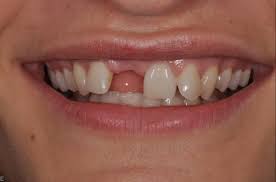Dental Implants
Dental implants are the ideal way of restoring a missing tooth. It is an artificial synthetic tooth root that a periodontist sets into the jaw to hold a bridge or a replacement tooth.
They are the perfect solution for people who generally have good oral health who just happened to have lost a tooth or teeth because of periodontal disease, an injury, or some other reason.
While high-tech in nature, dental implants are actually more tooth-saving than traditional bridgework, since implants do not rely on neighboring teeth for support.
Under proper conditions, such as placement by a specialist and diligent patient maintenance, implants can last a lifetime. Long-term studies continue to show improving success rates for implants.
Types of Implants in Use Today
Endosteal (in the bone) : The most commonly used type of implant. The various types include screws, cylinders or blades surgically placed into the jawbone. Each implant holds one or more prosthetic teeth. Endosteal type of implant is generally used as an alternative for patients with bridges or removable dentures.
Subperiosteal (on the bone): These are placed on top of the jaw with the metal framework’s posts protruding through the gum to hold the prosthesis. These types of implants are used for patients who are unable to wear conventional dentures and who have minimal bone height.
Advantages of Dental Implants Over Dentures or a Bridge
Every way you look at it, tooth restoration with dental implants are a better solution to the problem of missing teeth.
- Aesthetic: Dental implants look and feel like your own teeth! Since it integrates into the structure of your bone, they prevent the bone loss and Gum recession that often accompany bridgework and dentures. No one will ever know that you have a replacement tooth.
- Tooth-saving: Tooth implants don’t sacrifice the quality of your adjacent teeth like a bridge does because neighboring teeth are not altered to support the implant. More of your own teeth are left untouched, a significant long-term benefit to your oral health!
- Confidence: It will allow you to once again speak and eat with comfort and confidence! They are secure and offer freedom from the irksome clicks and wobbles of dentures. They’ll allow you to say goodbye to worries about misplaced dentures and messy pastes and glues.
- Reliable: Although there is a small chance of dental implant failure even if the treatment had been carried out with the utmost care, the success rate of dental implants is highly predictable. They are considered an excellent option for tooth replacement.
Mini Dental Implants
There are of two types. It varies with the diameter of the device. Small diameter implants are usually called Mini implants. Mini dental implant’s devices are of the diameter less than 3 millimeters.
SDI or small diameter implants and NDI or narrow diameter implant are the other names of MDI or mini dental implants.
The diameter of mini dental implants is generally between 1.8 mm to 2.9mm. It also has various lengths. The length is more important than diameter in mini implants because the pull out power is actually based on length of the device.
TIME FRAME FOR DENTAL IMPLANTS
“Dental implants are so natural-looking and feeling; you may forget you ever lost a tooth.”

